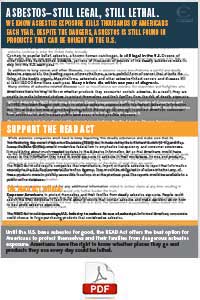Find out more about the READ Act
We know asbestos exposure kills thousands of americans each year. Despite the dangers, asbestos is still found in products that can be bought in the U.S.
Asbestos - Still Legal, Still Lethal We know asbestos exposure kills thousands of americans each year. Despite the dangers, asbestos is still found in products that can be bought in the U.S. Contrary to popular belief, asbestos, a known human carcinogen, is still legal in the U.S. Dozens of other countries have banned asbestos, yet tens of thousands of pounds of the ...
Asbestos – Still Legal, Still Lethal
We know asbestos exposure kills thousands of americans each year. Despite the dangers, asbestos is still found in products that can be bought in the U.S.
Contrary to popular belief, asbestos, a known human carcinogen, is still legal in the U.S. Dozens of other countries have banned asbestos, yet tens of thousands of pounds of the deadly substance make its way into the U.S. each year.
Asbestos exposure is the leading cause of mesothelioma, a rare, painful form of cancer that attacks the lining of the body’s organs. Mesothelioma, asbestosis and other asbestos-linked cancers and diseases kill at least 12,000 Americans each year. Many victims die within one year of diagnosis.
Americans have no way to know whether products they encounter contain asbestos. As a result, they are unable to make informed choices to protect themselves and their families from the risk of deadly exposure.
In 1988, President Reagan took steps to address asbestos exposure with the federal Asbestos Information Act. This archaic law was a good beginning, but it did not go far enough to protect American consumers from asbestos risk and increase public awareness around possible exposure.
Support the READ Act
The Reducing Exposure to Asbestos Database (READ) Act, introduced by Sen. Richard Durbin (D-Ill.) and Rep. Suzan DelBene (D-Wa.), would modernize federal law to emphasize transparency and consumer awareness. It would bring about much-needed updates to the Asbestos Information Act so that Americans would have access to the information they need to avoid exposure to asbestos in their workplaces, homes and products.
The READ Act would require companies that manufacture, import or handle asbestos to report that information annually to the U.S. Environmental Protection Agency. They would be obligated to disclose whether any of these products were in publicly accessible locations over the previous year. The reports would be available in a public online database.
The READ Act would:
Empower Americans to protect themselves and their families from deadly asbestos exposure. People could search the EPA’s database to learn more about products that contain asbestos and make decisions about how to best avoid asbestos exposure.
The READ Act would encourage U.S. industry to reduce its use of asbestos. Informed American consumers could choose to forgo purchasing products that contained as asbestos.
Until the U.S. bans asbestos for good, the READ Act offers the best option for Americans to protect themselves and their families from dangerous asbestos exposure. Americans have the right to know whether places they go and products they use every day could be lethal.







